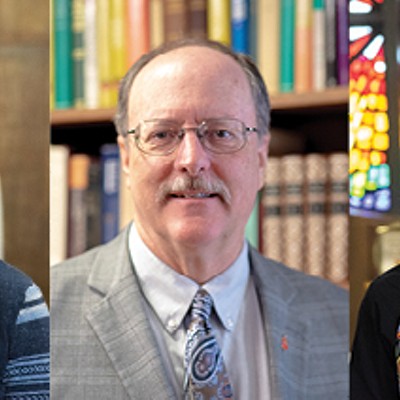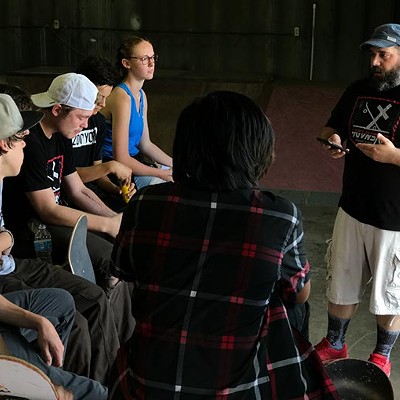The proposed change, Amendment 10-A, was approved at the General Assembly in July 2010 but could not go into effect without ratification by a majority of presbyteries, which refers to the regional governing bodies.
Tallying will continue until all U.S. presbyteries have voted, but the amendment is slated to go into effect in July of this year now that a majority of presbyteries have approved the amendment. All three Oklahoma presbyteries voted in favor of the changes.
Aaron Carland is the general presbyter for Indian Nations Presbytery, an area that includes the Oklahoma City metro area. Carland said he was not surprised that all three state presbyteries voted in favor of the changes in spite of Oklahoma’s conservative reputation.
“Many people, including Presbyterians, don’t understand the kinds of nuances that we Presbyterians ‘play with’ when it comes to constitutional matters in the church,” he said. “10-A was not a vote to ordain homosexuals. There has never been a ban against the ordination of gays and lesbians. The previous language applied to behavior, not to orientation.”
Carland said the old wording of ‘married or celibate’ had stirred “significant controversy” since it was adopted.
“The old language was not particularly helpful. The new language requires ordaining bodies to actually do what they are supposed to do, which is examine each candidate.”
Carland’s assessment is the very position the Rev. Mateen Elass, pastor of Edmond’s First Presbyterian Church, said is not accurate when evaluating the implications of 10-A. Elass joined other ministers and Presbyterian leaders in writing an open letter to the church on Feb. 2 of this year.
The first line, from which the letter’s name has been derived, reads: “To say the Presbyterian Church (USA) is deathly ill is not editorializing but acknowledging reality.” The “Deathly Ill” letter is stark in its use of language, warning of schism, creeping universalism and further denominational decline. The letter singles out homosexual ordination as a point of controversy, but says it only masks “deeper, more important divisions.”
Elass said he signed as one of the “concurring pastors” because the language of 10-A is a sign that “the denomination has cast off any objective moorings in sexual ethics.”
“Those who are less skeptical say this means ordaining bodies will have to actually do their jobs,” he said, “but this new flowery language means that ordaining bodies are no longer bound by obedience to Scripture. Instead, they are to be ‘guided by Scripture.’” Cynthia Rigby, W.C. Brown Professor of Theology at Austin Seminary, said the issue of biblical interpretation is the crux of the issue.
“I
think most of those who signed that letter believe the word of God
meets us ever anew and is unchanging in its capacity to meet us anew in
different contexts,” Rigby said. “Those who are opposed to 10-A view the
male/female or Adam-Eve relationship as paradigmatic for human
sexuality, so the ‘word’ isn’t allowed to meet us differently in this
issue.”
Rigby
admits hers is a theological position that the opposition would consider
“faulty.” In fact, Elass wrote on his personal blog: “We have now
publicly declared to the world that we Presbyterians have no necessary,
clearly identifiable sexual morality — the biblical and time-honored
Christian sexual ethic of fidelity within the covenant of marriage
between one man and one woman and of chastity in all other relationships
has been forsaken.”
The
possibility of a schism is looming. Elass points to an exodus that has
already occurred, where individuals and congregations have left for the
Evangelical Presbyterian Church or for the Presbyterian Church in
America, both more conservative than the PCUSA.
“Indian
Nations Presbytery voted against homosexual ordination in 2009,” Elass
said. “When the issue came back up this time, the presbytery had lost
one large evangelical congregation and several individuals, so the
conservative vote was lost. Liberals won the vote by a narrow margin.”
The
votes in two Oklahoma presbyteries were very close: 45-41 in favor in
Indian Nations and 55-53 in favor in the Eastern Oklahoma Presbytery.
The numbers indicate a significant division among Presbyterians in the
state.
“The word
‘schism’ is being used as a possibility of what might happen,” Elass
said, “but the schism has already taken place. The liberal mechanism has
separated itself from traditional Presbyterian orthodoxy by embracing a
non-biblical and non-reformed theological position.”
Carland
points out that the PCUSA has had “interior fights” for most of its
history. “This is not a wholesale move to the left. Our presbytery is
not about to go off ordaining someone with an ‘in your face’ homosexual
agenda. That is not who we are.”
Rigby
is one of a group of pastors and leaders who has now written and signed
a response to the “Deathly Ill” letter, asking the opposition to stay
in the denomination.











